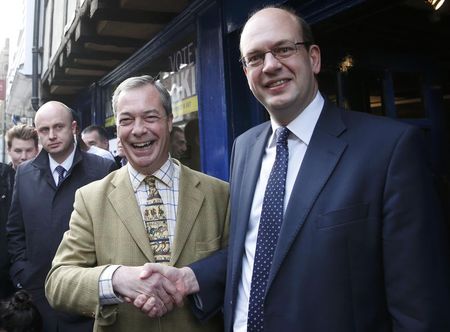By Andrew Osborn
LONDON (Reuters) - Prime Minister David Cameron's Conservatives risk losing a second British parliamentary seat to the anti-EU UKIP party on Thursday, foreshadowing a possible political upheaval in next year's national election.
With distrust of mainstream parties and anxiety about immigration rising, opinion polls suggest UKIP, the United Kingdom Independence Party, will easily win a special election in the southeast English constituency of Rochester and Strood.
Cameron's right-leaning Conservatives and the opposition left-wing Labour Party are facing simultaneous challenges from UKIP and Scottish nationalists that could revolutionise a two-party system in place since 1945.
In elections for the European parliament in May, UKIP, which favours immediate withdrawal from the European Union and sharply lower immigration, became the first party other than Labour or the Conservatives to win a nationwide vote since World War Two.
Last month, UKIP won its first elected seat in Britain's own parliament, when a Conservative switched parties, called for a special election and won back his seat for his new party.
Thursday's vote is taking place under similar circumstances, after the constituency's Conservative member of parliament Mark Reckless defected to UKIP and called for a special election to win back his own seat.
"If UKIP win today, in what is our 271st target seat, then I think all bets are off in terms of predicting what could happen next May. This will open up British politics in a remarkable way," said UKIP party leader Nigel Farage.
Victory for Reckless would deepen fears among European partners of a possible British exit from the EU and deal a blow to Cameron who ordered his party to mobilise its resources to hold Rochester, visiting the area five times before the ballot.
His main rivals Labour are in little better shape, with polls showing they may be wiped out next year in Scotland, a stronghold for generations, where the separatist Scottish National Party has surged despite losing a pro-independence referendum in September.
Thursday's voting got underway at 0700 with polls due to close at 2200. Final results are expected around 0300 GMT on Friday morning.
Success for UKIP would deepen Conservative fears of a split right-wing vote in an election to Britain's parliament next May, making it harder for Cameron to hold on to power. This could stoke disquiet among Conservative lawmakers about his leadership, some of whom might also be tempted to defect.
"People will realise that we're credible and a party that is likely to win many more seats in Westminster next year," if UKIP wins, Reckless told Reuters in an interview. He has told local media he is in talks with two Conservative lawmakers about defecting to UKIP if he wins.
POLITICAL RECONFIGURATION?
Reckless told Reuters the contest was part of a reordering of Britain's traditional system in which Conservative and Labour prime ministers have alternated power since the 1920s.
Cameron's party and Labour are neck-and-neck in opinion polls but neither looks likely to win an outright majority of parliamentary seats next May.
While Cameron's party is divided over Europe, Labour has been beset by internal doubt about Ed Miliband, its leader, who has fended off media reports this month that his party might ditch him just six months before the general election.
Labour controlled much of the Rochester constituency before the Conservatives won it in 2010, and a poor showing there on Thursday could resurrect grumbling about Miliband's performance.
The centrist Liberal Democrats have also seen support shrivel since joining Cameron in 2010 in the first British coalition government since World War Two, and could lose their role as Britain's third party.
Cameron once described UKIP as full of "fruitcakes, loonies and closet racists". But the party has transformed itself into a professional campaigning force, with telegenic leader Farage known for meeting voters in pubs with a pint of beer.
Cameron tried to neutralise UKIP by promising to renegotiate Britain's EU ties before holding an "in-out" referendum on membership in 2017. But he has yet to spell out exactly what changes he wants or forge strong alliances with EU partners to win them. His strategy has alarmed some EU allies.
"I love Britain and want to keep talking to them," Gunther Krichbaum, president of the German Bundestag's EU affairs committee and a member of Chancellor Angela Merkel's Christian Democrats, told Reuters. "But when the rhetoric is driving you at 100 miles per hour up a blind alley, you have to realise that you won't be able to turn round at the end of the blind alley."
IMMIGRATION FEARS
Free movement among its 28 members is a core principle of the European Union. When the bloc expanded to include low-wage former Communist Eastern European states a decade ago, Britain saw immigration surge, with a net influx of around 2 million migrants in the past decade that both Labour and Conservative-led governments failed to predict.
UKIP says the influx has pushed down wages and overwhelmed government services, and that EU rules make it impossible to address the issue without quitting the bloc.
It says the three mainstream parties ignored the issue, demonising critics of unrestricted migration as racists, even as it became a primary concern of ordinary people worried less about the race of the migrants than their numbers.
Cameron's party promised to cut net migration to the tens of thousands by next year's election, but it rose to 243,000 in the year to March 2014.
"Cameron is a liar," said Keith Marden, a retired construction worker in Strood who plans to vote UKIP. "He can't do anything on Europe."

Opinion polls have given UKIP a lead of up to 13 percentage points in Rochester, about 50 km (30 miles) from London.
(Additional reporting by Stephen Brown in Berlin and Will Russell in Rochester; Editing by Peter Graff)